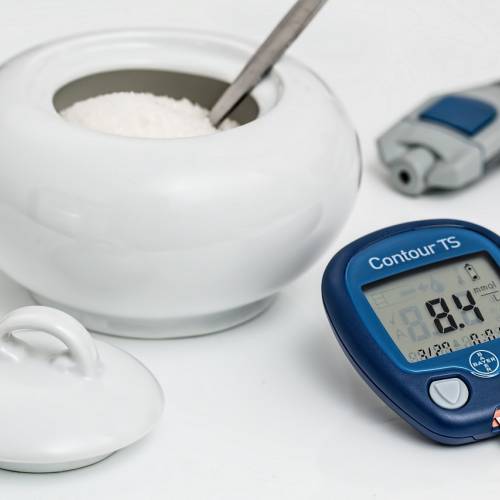Blood sugar can also be known as blood glucose.
Glucose is a sugar which comes from the food and drink we consume and is used as energy. Any that isn’t used straight away will be stored in cells for later when the body needs energy.
-
Blood sugar levels are a measurement of how much glucose is in your blood. They can change, going up and down throughout the day, before and after we eat.
Some food and drinks will provide the body with higher amounts of glucose than others. The foods that cause the greatest rise in blood sugar levels are those high in processed carbohydrates. These include cakes/sugary drinks, white bread, white pasta and rice, and biscuits.
Fibre is one component of carbohydrates that isn’t converted into sugar. High fibre carbohydrates such as whole-wheat pasta and brown rice, release the energy slower reducing spikes in blood sugar levels after meals and keep us feeling full for longer.
-
The body constantly works to maintain a healthy blood sugar level. If it is too high or too low, it can impact our health.
The body’s pancreas releases insulin to lower blood sugar (e.g. after eating) and glucagon to raise blood sugar when needed (e.g. during exercise when you need more energy).
-
Blood sugar is measured in millimoles per litre (mmol/L). The below shows normal blood sugar levels before and after eating.
NON-DIABETIC:
Before Meals: 4.0 - 5.9 mmol/L
At least 90 minutes after meals: Under 7.8 mmol/L
TYPE 1 DIABETES:
Before Meals: 4 - 7 mmol/L
At least 90 minutes after meals: 5 - 9 mmol/LTYPE 2 DIABETES:
Before Meals: 4 - 7 mmol/L
At least 90 minutes after meals: Under 8.5 mmol/L
-
Diabetes is a lifelong condition which causes a person’s blood sugar level to become too high.
Type 1 diabetes - the body’s immune system attacks and destroys the cells that produce insulin.
Type 2 diabetes - the body does not produce enough insulin, or the body does not respond properly to the insulin that is being produced.
During pregnancy, some women have high levels of blood sugar and their body is unable to produce enough insulin to absorb it all. This is called gestational diabetes.
Symptoms of Diabetes
- Feeling very thirsty
- Going to the toilet more than usual, especially at night
- Feeling very tired
- Genital itching or thrush
- Blurred eyesight
- Cuts and wounds taking longer to heal
- Losing weight without trying to
Diabetes can increase the risk of heart disease and stroke. Unfortunately Type 1 diabetes cannot be prevented; however, you can manage it. Type 2 Diabetes is preventable as it is usually caused by lifestyle factors.
-
In addition to support and advice from your GP you can reduce your risk by making changes to your lifestyle.
- Manage your weight
- Eat a healthy, balanced diet
- Increase your physical activity
- Limit your alcohol intake.
Find out more about lifestyle changes you can make to keep healthy:
Our Well Checks include a blood sugar test as well as a lifestyle assessment and give you the opportunity to speak to one of our qualified health promotion officers about any concerns you have around your health, and receive personalised tips and advice.
Find out moreDownload our Blood Sugar Factsheet:
-
Blood Sugar FactsheetDownload pdf

